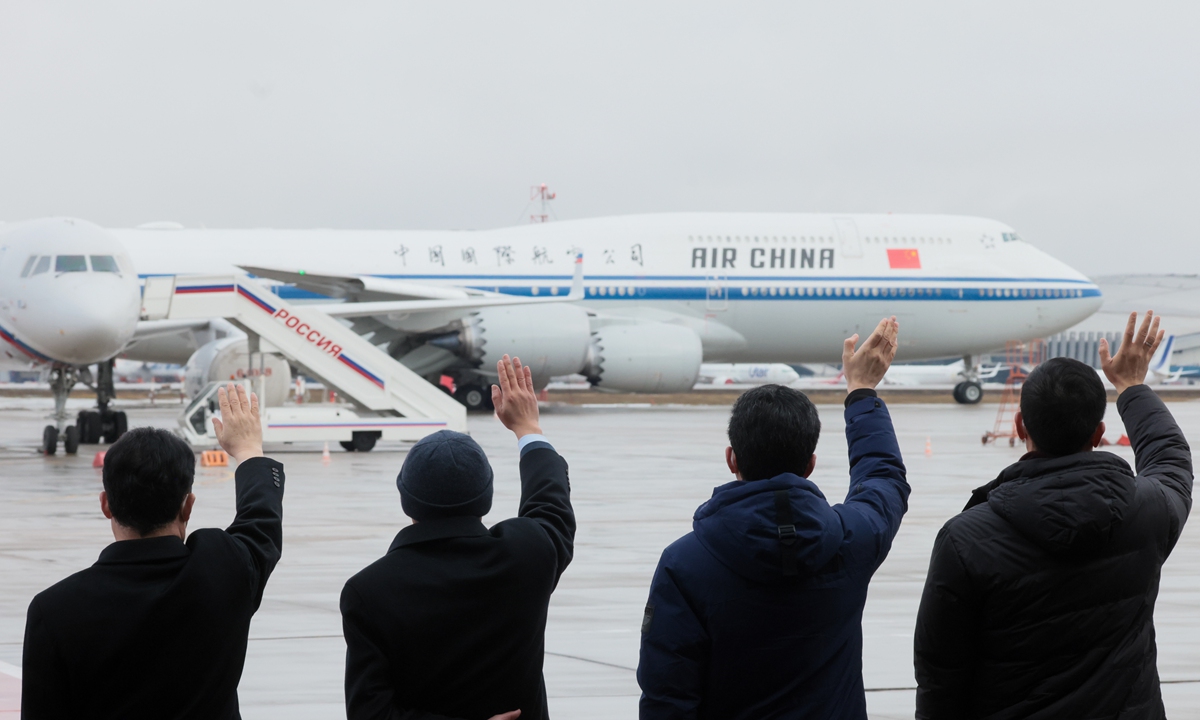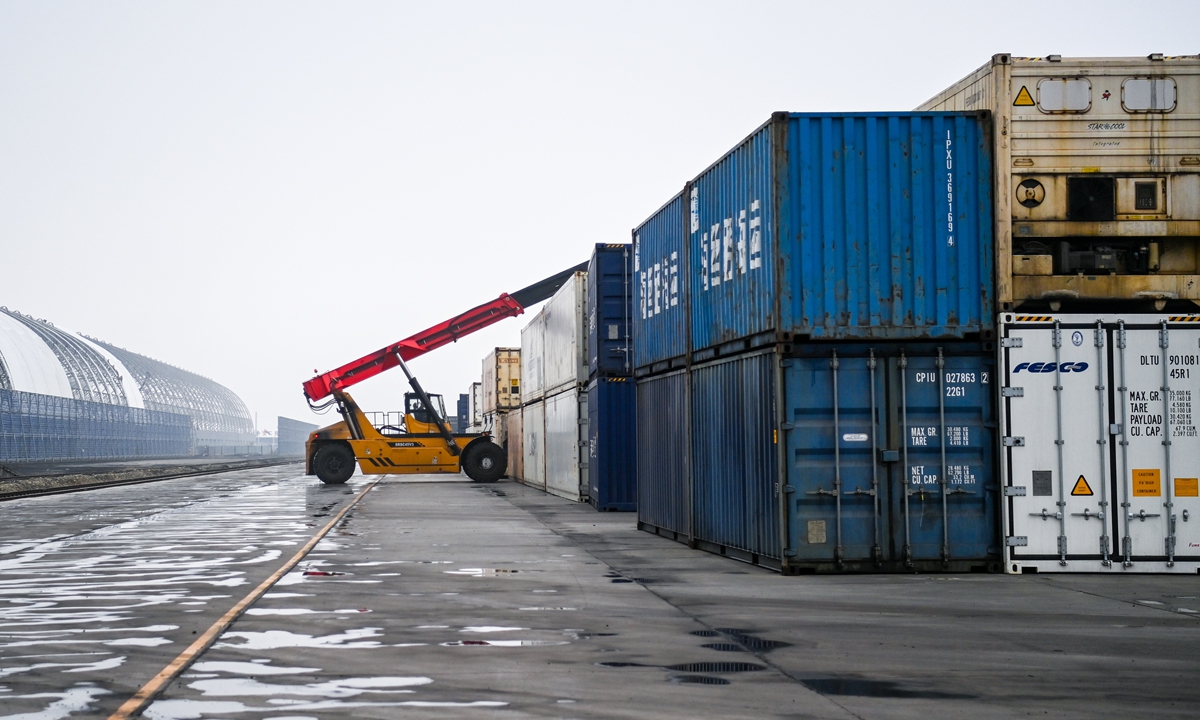Xi's successful visit to Russia 'globally significant,' joint statements to guide future comprehensive coordination

A send-off ceremony for Chinese President Xi Jinping takes place at Vnukovo-2 Government Terminal of Vnukovo International Airport, Moscow, on March 22. Photo: VCG
Chinese President Xi Jinping returned to Beijing on Wednesday evening after wrapping up a state visit to Russia, as experts said the two joint statements signed by China and Russia this time show that the strategic partnership remains rock solid and will keep benefiting not only the two peoples on all fronts, but also keep promoting world peace and the improvement of global governance.
On the Ukraine crisis, China and Russia reached some significant consensuses including agreeing that the purposes and principles of the UN Charter must be observed and international law must be respected. Analysts said the consensuses between the two countries set up a foundation to start a potential peace process, and China will keep engaging with other key members of the international community and parties concerned to further discuss the mediation.
China-Russia relations go far beyond the bilateral scope and are crucial to the world and the future of mankind, Xi said at a joint press conference with Russian President Vladimir Putin on Tuesday. Experts said a solid strategic partnership between the two major powers brings certainty to the world and could reinforce and rebuild the power balance between major countries that has been seriously damaged by the US in recent years, which is significant for world peace in general.
Every meeting between the top leaders of the two countries "is a catalyst that can accelerate cooperation," Andrey Kortunov, director-general of the Russian International Affairs Council, told the Global Times on Wednesday.
It is a powerful signal to state bureaucrats, diplomats, the private sector, civil society institutions and other important sectors that they should speed up their interactions and bring their cooperation to a new level, Kortunov said.
Li Haidong, a professor at the Institute of International Relations at the China Foreign Affairs University, told the Global Times on Wednesday that Xi's visit shows that apart from guiding the development of bilateral ties, China is also taking on the responsibility of a major country to coordinate with another major country on an issue of global concern.
The key for the purposes and principles of the UN Charter to be observed effectively is that major powers can coordinate with each other and solve their problems via coordination, and at present, no other major country like China can fulfill this duty, Li noted.

A truck carries containers at a railway port in Hunchun, northeast China's Jilin Province on March 22, 2023. Hunchun, as a major trade channel, has the railway port and the highway port to Russia. Photo: Xinhua
Comprehensive partnership
In the Joint Statement of the People's Republic of China and the Russian Federation on Deepening the Comprehensive Strategic Partnership of Coordination for the New Era, the two sides pointed out that China-Russia relations are not the kind of military-political alliance seen during the Cold War, but transcend such a model of state-to-state relations and have the nature of no-alliance, no-confrontation and not targeting any third party.
Chinese experts said this once again clarifies that the China-Russia partnership is not going to have bloc-to-bloc confrontation with the US-led alliance as the Western media has misinterpreted. If China intends to align with Russia and fight the West together, then they would see a different picture, rather than seeing China making efforts to mediate the Ukraine crisis and keep communicating with all parties concerned.
The reason why the US, and some US-led military alliances in Europe and the Asian-Pacific region like NATO and AUKUS have been criticized in the statement is that China and Russia both sense the danger of a new Cold War and hostility from the same country, experts said.
Li said that the China-Russia relations reflect that coordination is key for balance and mutual-trust between major powers, and that China wants to develop stable and successful ties with other major powers like the US and the EU, and "we hope China's relations with other major powers will not affect each other."
In the statement, both sides agreed to strengthen cooperation in law enforcement such as preventing "color revolution," and cracking down on the "three forces" including the "East Turkistan Islamic Movement," transnational organized crime and economic and drug crime. The statement shows that China and Russia will continue to coordinate Middle East and African affairs.
These show that the two countries share broad consensuses on diplomacy and security issues, and will keep supporting each other in efforts to promote global governance and safeguard world peace. There is likely to be more direct and joint actions between the two sides on counterterrorism and more intelligence cooperation for political security, said experts.
Xi and Putin also signed the Joint Statement of the President of the People's Republic of China and the President of the Russian Federation on Pre-2030 Development Plan on Priorities in China-Russia Economic Cooperation at Kremlin on Tuesday.
The summit is also a signal that the strategic partnership between Moscow and Beijing stays rock hard, which is particularly important in the highly volatile and unstable international environment, said Kortunov.
Ukraine crisis meditation
The US issued comments on the China-Russia joint statement on Tuesday. According to the White House website, John Kirby, the White House national security spokesperson, said the Chinese leader should urge Russia to end its "invasion of Ukraine" if China wants to "play a constructive role on the Ukraine crisis."
The US is actually trying to make a cease-fire more difficult and wants to end the peace process from the very beginning, as it knows its call is not realistic at the moment. If it bans Kiev from considering a cease-fire and talks, the bloodshed will just continue and the risk of escalation will remain, said Chinese analysts.
Li said the key reason why a conflict breaks out between Russia and Ukraine is that the geopolitical security landscape in Europe has been ruined by the US, and now the US is openly opposing a cease-fire and refuses to stop adding fuel to the fire. This just proves that the US wants to make a cease-fire impossible so the conflict lasts as long as possible.
Brazilian President Luiz Inacio Lula da Silva is scheduled to visit China next week. Lula recently told the media that he praised Xi's visit to Russia, noting that "it is already great news that China has gone there, good news," and he will discuss mediation in the Ukraine crisis with Xi.
French President Emmanuel Macron said in February that he will visit China in early April, in part to seek Chinese help with ending the Ukraine crisis. "The fact that China engages in peace efforts is a good thing," Macron told the media.
It is predictable that China will coordinate with more partners worldwide for crisis mediation, experts said. After reaching consensus with Russia, China will engage with other major powers with key influence like Brazil and France, and will keep in touch with Ukraine, and also might seek suggestions from other key neutral parties like India and Turkey, to build a foundation for the cease-fire and peace process that shares international consensus, analysts said.
At that time, if the US still opposes the cease-fire, then the world will clearly see who stands on the side of peace, and who stands in opposition to the vast majority of international community, experts noted.

